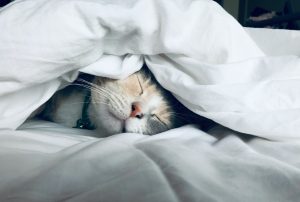
Sleep is so important to our overall health and ability to function during the day. But 1 in 5 of us in the UK are said to not be getting enough sleep.
My sleep has been disrupted with the onset of perimenopause. (See my previous blog for more about my experience with perimenopause).
So I asked my colleague Holly, who has just completed training as a sleep consultant, for her top tips on sleeping better.
She explains: “Creating a regular sleep pattern is really important. Go to bed at the same time if possible during the week and the weekend.
“Begin reducing the lighting in your room as you begin to prepare for sleep. Dimmer lights or using a lamp rather than the main lights can help set the mood for sleep.
“Remove the blue light sources which are common from electrical devices such as mobile phones, computers and TVs. Blue light makes your body think it is daytime so it is hard to sleep.
“Try not to consume caffeine at least 3 hours before sleep as this can raise adrenaline levels, keeping you alert.
“Avoid napping or lay-ins to regain ‘lost sleep’. You may think they are helping you get back lost sleep but they actually make it harder to sleep because you are disrupting your normal sleep cycle.”
Zoe
